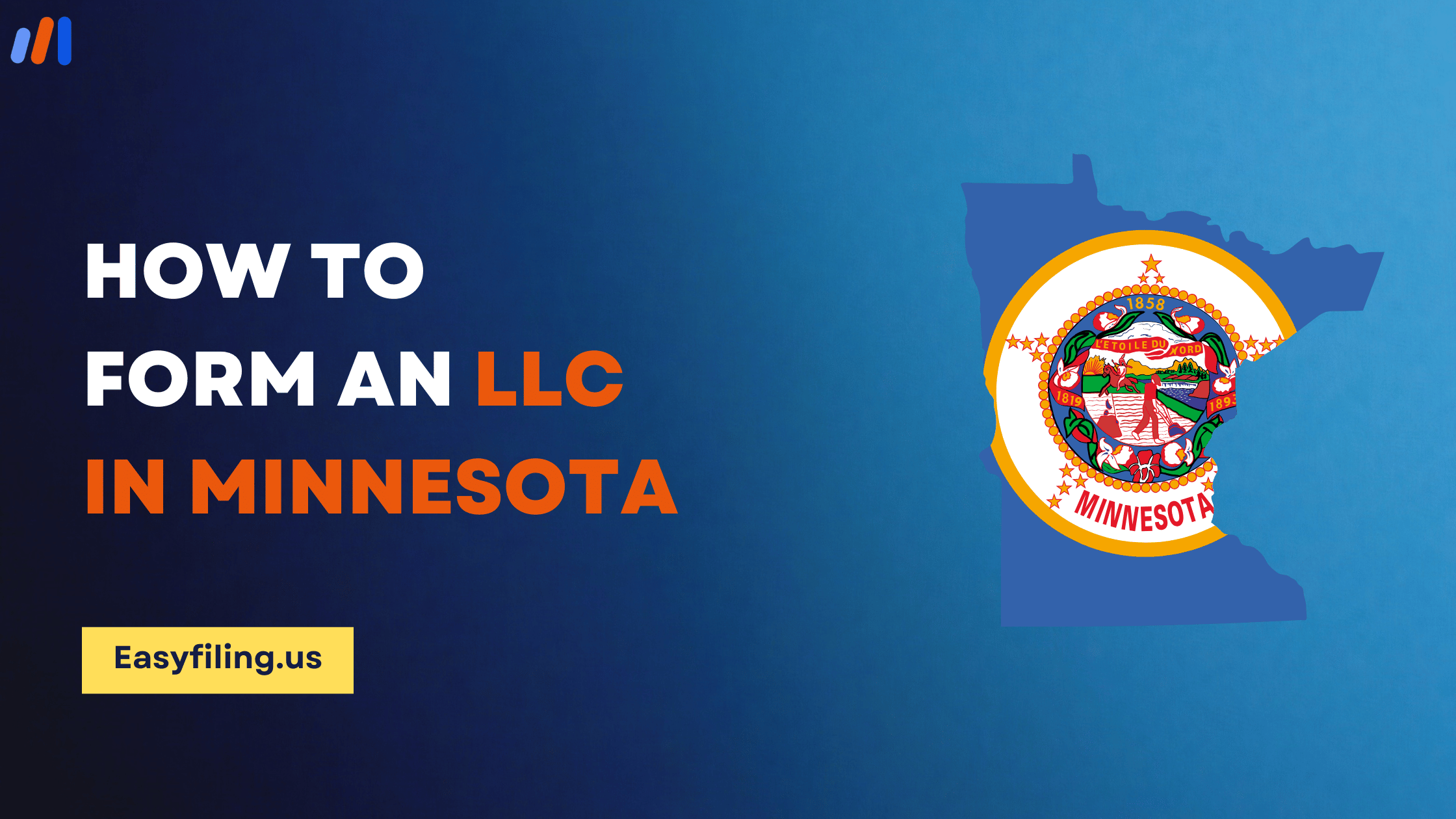If you want to expand your business in Minnesota, you must be prepared to form a Limited Liability Company, also known as LLC. This allows you to save taxes, protect your assets, and run your business efficiently.
When you form an LLC, you legally differentiate between your personal and your business debts which ensure safety and security.
More to this, LLCs are more flexible when it comes to options regarding tax as the owner is free to select the tax structure that is suitable for her/his business.
This setup also makes administrative aspects less complicated hence enabling the management to concentrate on the growth of the business.
Forming an LLC in Minnesota will enable you to maximize many such benefits in the long run, even if you are looking to start or reform an older business.
This step-by-step guide will show you how to create an LLC in Minnesota with all its nuances, from the name you choose for the entity to the paperwork required to form an LLC.
Why Form an LLC in Minnesota?
Liability Protection: One of the greatest advantages of creating an LLC is indeed the fact that the owner’s business assets and their assets are separate. Thus, generally speaking, the owner’s estate is protected from the business debts and liabilities.
Tax Flexibility: LLCs show flexibility in taxation that the business owner may choose to have. So you can be taxed as a sole proprietor, partial owner, or even a corporation; this ensures that you choose a tax structure that fits your enterprise’s financial resources.
Simplified Management: Generally, LLCs are simpler to run and manage as compared to corporations. They do not impose rigid protocols, for example, annual meetings or resolutions that with a formality.
Credibility and Professionalism: An LLC can enhance the business’s professional image which is always desirable when interacting with customers, suppliers, and investors.

Step 1: Choose a Name for Your LLC.
Name Requirements: Your business name must be unique and may not be similar to other existing names of business entities provided in Minnesota that are already organized. It should contain the phrase, “Limited Liability Company” or its short form, ‘LLC’ or ‘L.L.C.’”.
Check Availability: The Minnesota Secretary of State’s business search can also be utilized to see if the business name the owner intends to use should be unique or not too closely related to other existing businesses. This will prevent many legal problems as well as instances of confusion in the future.
Reserve Your Name (optional): You want the name you have in mind if forming a limited liability company is not in your plans, there’s something the state allows you to do. This step is optional: it states that it is better to have a name. Make a name reservation by filing a “Name Reservation” with the state at a fee of $55. The name can be reserved for a maximum of twelve months.
Step 2: Appoint a Registered Agent
Role of Registered Agent: A registered agent is defined as a member or entity selected to accept legal notifications and messages concerning the limited liability company. It also encompasses the service of process in the case’s lawsuit and other significant communications.
Eligibility: This agent could be an individual who is a Minnesota resident, or it could be a business entity registered in the state. The registered agent must be able to present a physical address. A street address in Minnesota, not a PO Box, is necessary.
Step 3: File Articles of Organization
Filing Requirements: Prepare your Articles of Organization, which is a legal document indispensable for LLC registration with the Minnesota Secretary of State, to get over the filing requirements. Any mistakes in this document create the risk that it will not be processed promptly.
Contents: Typically included in the Articles of Organization of the LLC are the selected name of the LLC, the name or the address of the registered agent, and the management structure on whether it’s to be member-managed or manager-managed.
Filing Fee: If an individual submits the Articles of Organization documents in person or online, the fee is $155. If an individual opts to submit the documents by mail, the fee is $135. Please note that such fees are not subject to refund.
Submission: You can either file for the Articles of Organization on the Minnesota Secretary of State’s website if you want them processed faster or by mailing them out or hand delivering them.
Step 4: Formulate an Operating Agreement
Purpose: An operating agreement is a formalized understanding of the ownership and the operational framework and structure of the LLC. Although Minnesota law does not mandate its adoption, it is advisable since it is an in-house document that mitigates the risk of disputes among the members.
Contents: Your operating agreement should address amongst other issues the following features: members and their roles, member voting power and responsibilities, profit shares, and the manner of decision-making as well as management of the company. It is a very important document in that it reinforces the operating structure of your LLC.
Step 5: Apply for an Employer Identification Number or EIN
Purpose: The EIN, which stands for Employer Identification Number, is also known as the Federal Tax ID Number and is issued by the IRS to distinguish a business entity for taxation purposes. It is very important if you want to employ staff, start a business bank account, or make returns for federal taxes. It performs the function or role of identifying your establishment for taxation purposes.
Application: EIN can be applied for free online through the IRS website. The slowest part of the process is the submission where most applications are accepted instantly after their completion with EIN provided right away.
Step 6: Fulfill Minnesota Tax and Regulatory Requirements
Business Licenses: Various types of businesses will require different kinds of local and state permits or licenses and in this case, the LLC of yours will also require some. So make sure that you familiarize yourself with the sectors and locales requirements.
Sales Tax: If your LLC will be providing taxable goods or services, you must obtain a Minnesota Sales and Use Tax Permit from the Minnesota Department of Revenue. This will permit you to charge sales tax on customer orders and pay it over to the state.
Step 7: Submit the Annual Renewals
Requirement: In Minnesota, all LLCs are required to submit an annual renewal of their registration if they intend to remain compliant with state laws. This renewal links your records to those of the state through the registration process.
Due Date: Every state has a various due date for the annual renewal, but for the case of Minnesota, it is the last day of the year i.e. December 31. This is a critical date and should not be overlooked since penalties will be incurred.
Fee: If the renewal is submitted on the due date, there is no fee for this renewal process. However, in cases where the renewal submission is made after the designated deadline, a late fee will be charged. Certain other unnecessary issues may also arise, which may result in a violation of your business’s restrictions.
Conclusion
If you have closely followed every step, congratulations, you are ready to form an LLC in Minnesota State or any other state. Of course, some state rules and core business activities can differ, and this is where legal advice will come in very handy.
Book a free consultation and learn how to form an LLC in Minnesota and any other relevant information you might need.
Frequently Asked Questions (FAQs)
What does it cost to register an LLC in Minnesota?
Filing the Articles of Organization fees in Minnesota can be around 155 USD for mailing and filing online. There may be added expenses such as acquiring an EIN and registering for other permits as required.
What is the procedure for establishing an LLC in Minnesota and how long does this take?
The establishment of an LLC in this state has no fixed timeframe. For example, documents filed online are typically completed within a week. However, documents that have been posted may take significantly longer 4 to about 6 weeks to complete.
Are lawyers necessary in setting up an LLC in Minnesota?
A lawyer is not required to form an LLC in Minnesota, but it would certainly be helpful. A lawyer can assist in making sure all necessary legal documents are required and can have valuable insights into the structuring of your LLC.
Are only citizens of Minnesota capable of establishing monopolistic LLCs?
Yes, even if you are not a resident of Minnesota you can still form an LLC in Minnesota. Nevertheless, you need to designate a registered agent who is either a Minnesota resident or a Minnesota-registered business entity.
File Your LLC Today
25$ off with a coupon
Lock in EasyFiling's transparent rates and get lifetime compliance support at no extra cost.
Get Started Now










